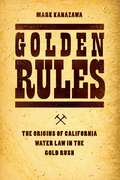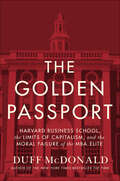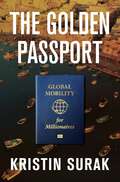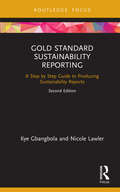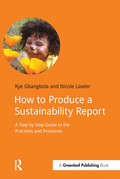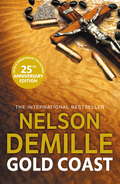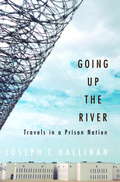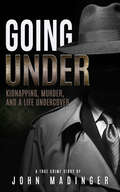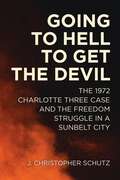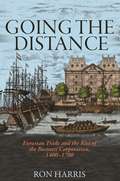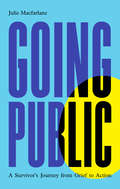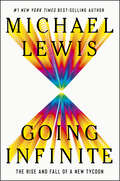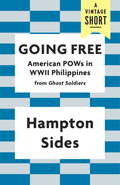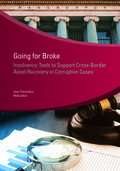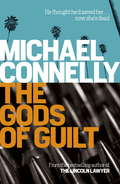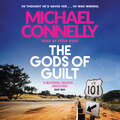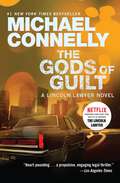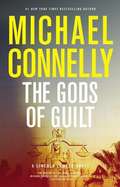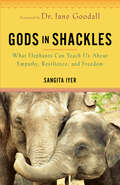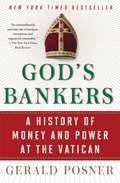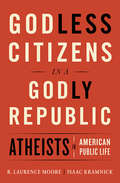- Table View
- List View
Golden Rules: The Origins of California Water Law in the Gold Rush
by Mark KanazawaFresh water has become scarce and will become even more so in the coming years, as continued population growth places ever greater demands on the supply of fresh water. At the same time, options for increasing that supply look to be ever more limited. No longer can we rely on technological solutions to meet growing demand. What we need is better management of the available water supply to ensure it goes further toward meeting basic human needs. But better management requires that we both understand the history underlying our current water regulation regime and think seriously about what changes to the law could be beneficial. For Golden Rules, Mark Kanazawa draws on previously untapped historical sources to trace the emergence of the current framework for resolving water-rights issues to California in the 1850s, when Gold Rush miners flooded the newly formed state. The need to circumscribe water use on private property in support of broader societal objectives brought to light a number of fundamental issues about how water rights ought to be defined and enforced through a system of laws. Many of these issues reverberate in today’s contentious debates about the relative merits of government and market regulation. By understanding how these laws developed across California’s mining camps and common-law courts, we can also gain a better sense of the challenges associated with adopting new property-rights regimes in the twenty-first century.
The Golden Passport: Harvard Business School, the Limits of Capitalism, and the Moral Failure of the MBA Elite
by Duff McDonaldWith The Firm, financial journalist Duff McDonald pulled back the curtain on consulting giant McKinsey & Company. In The Golden Passport, he reveals the inner works of a singular nexus of power, ambition, and influence: Harvard Business School.Harvard University still occupies a unique place in the public’s imagination, but the Harvard Business School eclipsed its parent in terms of influence on modern society long ago. A Harvard degree guarantees respect. But a Harvard MBA near-guarantees entrance into Western capitalism’s most powerful realm—the corner office. And because the School shapes the way its powerful graduates think, its influence extends well beyond their own lives. It affects the organizations they command, the economy they dominate, and society itself. Decisions and priorities at HBS touch every single one of us.Most people have a vague knowledge of the power of the HBS network, but few understand the dynamics that have made HBS an indestructible and dominant force for almost a century. Graduates of HBS share more than just an alma mater. They also share a way of thinking about how the world should work, and they have successfully molded the world to that vision—that is what truly binds them together.In addition to teasing out the essence of this exclusive, if not necessarily “secret” club, McDonald explores two important questions: Has the school failed at reaching the goal it set for itself—“the multiplication of men who will handle their current business problems in socially constructive ways?” Is HBS complicit in the moral failings of Western capitalism?At a time of soaring economic inequality and growing political unrest, this hard-hitting yet fair portrait offers a much-needed look at an institution that has had a profound influence not just in the world of business but on the shape of our society—and on all our lives.
The Golden Passport: Global Mobility for Millionaires
by Kristin SurakThe first comprehensive on-the-ground investigation of the global market for citizenship, examining the wealthy elites who buy passports, the states and brokers who sell them, and the normalization of a once shadowy practice.Our lives are in countless ways defined by our citizenship. The country we belong to affects our rights, our travel possibilities, and ultimately our chances in life. Obtaining a new citizenship is rarely easy. But for those with the means—billionaires like Peter Thiel and Jho Low, but also countless unknown multimillionaires—it’s just a question of price.More than a dozen countries, many of them small islands in the Mediterranean, Caribbean, and South Pacific, sell citizenship to 50,000 people annually. Through six years of fieldwork on four continents, Kristin Surak discovered how the initially dubious sale of passports has transformed into a full-blown citizenship industry that thrives on global inequalities. Some “investor citizens” hope to parlay their new passport into visa-free travel—or use it as a stepping stone to residence in countries like the United States. Other buyers take out a new citizenship as an insurance policy or to escape state control at home. Almost none, though, intend to move to their selected country and live among their new compatriots, whose relationship with these global elites is complex.A groundbreaking study of a contentious practice that has become popular among the nouveaux riches, The Golden Passport takes readers from the details of the application process to the geopolitical hydraulics of the citizenship industry. It’s a business that thrives on uncertainty and imbalances of power between big, globalized economies and tiny states desperate for investment. In between are the fascinating stories of buyers, brokers, and sellers, all ready to profit from the citizenship trade.
Gold Standard Sustainability Reporting: A Step by Step Guide to Producing Sustainability Reports
by Kye Gbangbola Nicole LawlerThis highly practical and concise book shows you how to undertake a reporting process and produce a sustainability report in line with the new standards and frameworks presented by the International Integrated Reporting Council (IIRC) and the Global Reporting Initiative (GRI). Fully updated to ensure compliance with the new standards, this second edition shows how to actually produce a sustainability report as well as the key processes in the planning: how to produce a business case; the development of actions plans; process and team leadership; and generating cross-functional buy-in. Templates are provided for certain steps in order to simplify the tasks involved at each point in the process. Anyone involved in delivering or developing a process to embed sustainability reporting for an organisation will find this book invaluable, for example, chief sustainability officers, chief financial officers and company secretaries. It will also be of interest to students in the field of sustainability.
Gold Standard Sustainability Reporting: A Step by Step Guide to Producing Sustainability Reports
by Kye Gbangbola Nicole LawlerThis how-to book provides a step-by-step guide to the constituent practices and processes needed to produce a sustainability report, structured around the Global Reporting Initiative’s Sustainability Reporting Process. It is written by the first GRI Certified training providers in the UK, who also produced the first GRI Certified Training course to be accredited by the Institute of Environmental Management & Assessment (IEMA). This book will show you: (1) how to produce a business case, develop action plans, secure leadership over process and people, and how to generate cross functional buy in, (2) how to do stakeholder engagement, materiality and assurance, and how to collect quality data and (3) how to plan and prepare to report, how to finalize and disseminate a report, and how to apply and manage the GRI Materiality Matters Check. The authors also provide invaluable tips on how to write a report, and how to position it on media platforms for both dissemination and feedback.In short, this book is a masterclass on precisely the things that individuals and organizations need and want to know to set up or improve the quality of their reporting processes, and to write effective reports.# This book will also enable stakeholders with a professional, personal or academic interest in reporting to learn how to evaluate a report – an essential skill for report writers too.
Gold Coast (John Sutter)
by Nelson DeMilleThe upmarket and salubrious area of Long Island is the stamping ground for a dying breed of America's super-rich. It is also the residence of John Sutter, lawyer - very top-drawer, old money, right clubs - and his sensual wife, Susan. Their lives are about to be turned dramatically upside down by their new 'next-door' neighbour - a certain Mr Frank Bellarosa, top Mafia don and master manipulator. It is he who will impress upon them a rule much older than the archaic etiquette of the old-money set: a favour accepted is a favour owed.Twenty-five years after it was first published, Nelson DeMille's Gold Coast stands as a modern thriller classic, a stylish, compelling and provocative novel will grip readers from beginning to end.
Going Up the River: Travels in a Prison Nation
by Joseph T. HallinanThe American prison system has grown tenfold in thirty years, while crime rates have been relatively flat: 2 million people are behind bars on any given day, more prisoners than in any other country in the world -- half a million more than in Communist China, and the largest prison expansion the world has ever known. In Going Up The River, Joseph Hallinan gets to the heart of America's biggest growth industry, a self-perpetuating prison-industrial complex that has become entrenched without public awareness, much less voter consent. He answers, in an extraordinary way, the essential question: What, in human terms, is the price we pay? He has looked for answers to that question in every corner of the "prison nation," a world far off the media grid -- the America of struggling towns and cities left behind by the information age and desperate for jobs and money. Hallinan shows why the more prisons we build, the more prisoners we create, placating everyone at the expense of the voiceless prisoners, who together make up one of the largest migrations in our nation's history.
Going Under: Kidnapping, Murder, and a Life Undercover
by John Madinger&“I just want to make sure I&’ve got this right. You hanged all three of them? ...&” That&’s how it began, a case where the cops are crooks and the crooks are cops, a kidnapping where the victim is the bad guy, and the good guys must cross some lines to get him back. Welcome to the upside down and backward world of the undercover agent, where nothing is as it seems, and people – including the undercover – may not be what they appear.?GOING UNDER: Kidnapping, Murder, and A Life Undercover by former undercover agent John Madinger takes you into that world, and closer to the truth of the undercover experience than any other law enforcement memoir has ever gone. ""What is it like to work undercover?"" You&’re a sheepdog in wolf&’s clothing, running with the pack, and Madinger ran with the wolves for almost two decades. Now he shares his story to give you a unique look at American crime and the ""War on Drugs"" from the perspective of both cops and criminals. You&’ll go with the undercover cops to meetings with street-corner hustlers and rip-off artists and into the lives of the America&’s biggest rock stars, the world&’s richest man, an Academy Award-winning actor, the marijuana traffickers conspiring to assassinate a federal judge, and the President of the United States. It&’s an amazing ride, and there has never been another story like it.
Going to Hell to Get the Devil: The 1972 Charlotte Three Case and the Freedom Struggle in a Sunbelt City (Making the Modern South)
by J. Christopher SchutzThe 1968 burning of the Lazy B Stables in Charlotte, North Carolina, attracted little notice beyond coverage in local media. By the mid-1970s, however, the fire had become the center of a contentious and dubious arson case against a trio of Black civil rights activists, who became known as the “Charlotte Three.” The charges against the men garnered interest from federal law enforcement agents, investigative journalists— including one who later earned a Pulitzer Prize for coverage of the trials—numerous New Left and Black Power activists, and Amnesty International, which declared the defendants “political prisoners.” In Going to Hell to Get the Devil, J. Christopher Schutz offers the first comprehensive examination of this controversial case and its outcome. In the 1960s and 1970s, Charlotte’s leaders sought to portray their home as a placid, business-friendly, and racially moderate community. When New Left and Black Power activists threatened that stability, city leaders employed a variety of means to silence them, including the use of law enforcement against African Americans they deemed too zealous. In the Charlotte Three case, prosecutors paid prisoners for testimony against the Black activists on trial, resulting in their convictions with lengthy prison sentences. The unwanted publicity surrounding the case of the Charlotte Three became a critical pivot point in the Queen City’s post–World War II trajectory. Going to Hell to Get the Devil tells more than the story of an arson case; it also tells the story of the South’s future, as the fate of the Charlotte Three became emblematic of the decline of the African American freedom struggle and the causes it championed.
Going the Distance: Eurasian Trade and the Rise of the Business Corporation, 1400-1700 (The Princeton Economic History of the Western World #88)
by Ron HarrisBefore the seventeenth century, trade across Eurasia was mostly conducted in short segments along the Silk Route and Indian Ocean. Business was organized in family firms, merchant networks, and state-owned enterprises, and dominated by Chinese, Indian, and Arabic traders. However, around 1600 the first two joint-stock corporations, the English and Dutch East India Companies, were established. Going the Distance tells the story of overland and maritime trade without Europeans, of European Cape Route trade without corporations, and of how new, large-scale, and impersonal organizations arose in Europe to control long-distance trade for more than three centuries.Ron Harris shows that by 1700, the scene and methods for global trade had dramatically changed: Dutch and English merchants shepherded goods directly from China and India to northwestern Europe. To understand this transformation, Harris compares the organizational forms used in four major regions: China, India, the Middle East, and Western Europe. The English and Dutch were the last to leap into Eurasian trade, and they innovated in order to compete. They raised capital from passive investors through impersonal stock markets and their joint-stock corporations deployed more capital, ships, and agents to deliver goods from their origins to consumers.Going the Distance explores the history behind a cornerstone of the modern economy, and how this organizational revolution contributed to the formation of global trade and the creation of the business corporation as a key factor in Europe’s economic rise.
Going Public: A Survivor's Journey From Grief To Action
by Julie MacfarlaneGoing Public merges the worlds of personal and professional, activism and scholarship. Drawing upon decades of legal training, Macfarlane decodes the well-worn methods used by church, school, and state to silence survivors, from first reporting to cross-examination to non-disclosure agreements. At the same time, she lays bare the isolation and exhaustion of going public in her own life, as she takes her abuser to court, challenges her colleagues, and weathers a defamation lawsuit.
Going Infinite: The Rise And Fall Of A New Tycoon
by Michael LewisAN INSTANT #1 NEW YORK TIMES BESTSELLER One of the New Yorker's Best Books of 2023 • One of Pure Wow's 42 Book to Gift This Year • One of Fortune's Best Crypto Books of 2023 "Going Infinite is in many ways Lewis at his best. He marshals a complex global story without losing sight of the delightful and revealing human details. He is a world-class noticer."—Jesse Armstrong, writer and creator of HBO’s Succession, Times Literary Supplement "A stupefyingly pleasurable book to read." —Gideon Lewis-Kraus, The New Yorker "Going Infinite is an instant classic." — Helen Lewis, The Atlantic "Going Infinite is wildly entertaining, surprising multiple times on pretty much every page, but it adds up to a sad story, even a tragedy, for its central character and for all the people who lost so much thanks to his actions." —John Lanchester, London Review of Books "Will join Digital Gold as one of the all-time best crypto books."—Jeff John Roberts, Fortune "A wry, engaging writer and a gifted storyteller." —Julia M. Klein, Los Angeles Times "It may be easy to take for granted how entertainingly [Michael Lewis] pulls it off again in Going Infinite." —Brett Martin, GQ From the best-selling author of The Big Short and Flash Boys, the story of FTX’s spectacular collapse and the enigmatic founder at its center. When Michael Lewis first met him, Sam Bankman-Fried was the world’s youngest billionaire and crypto’s Gatsby. CEOs, celebrities, and leaders of small countries all vied for his time and cash after he catapulted, practically overnight, onto the Forbes billionaire list. Who was this rumpled guy in cargo shorts and limp white socks, whose eyes twitched across Zoom meetings as he played video games on the side? In Going Infinite Lewis sets out to answer this question, taking readers into the mind of Bankman-Fried, whose rise and fall offers an education in high-frequency trading, cryptocurrencies, philanthropy, bankruptcy, and the justice system. Both psychological portrait and financial roller-coaster ride, Going Infinite is Michael Lewis at the top of his game, tracing the mind-bending trajectory of a character who never liked the rules and was allowed to live by his own—until it all came undone.
Going Free: American POWs in WWII Philippines (A Vintage Short)
by Hampton SidesAn eBook short.From Hampton Sides's Ghost Soldiers, a gripping narrative of World War II POWs on the brink of freedom. The men of Cabanatuan had been held by the Japanese since the Bataan Death March, in increasingly dire circumstances. With the war turning in the Americans' favor, the POWs worried that their captors would murder them all in the frenzy of an all-out withdrawal. Then one day in early January, 1945, the prison guards simply left. For a brief moment the haggard survivors of Cabanatuan were given the keys to their prison, though swift death was promised to anyone who dared leave. The prisoners waited nervously, all while (unbeknownst to them) a daring raid was being planned which would result in their rescue or their end. This is Hampton Sides at his most riveting, a fitting tribute to these soldiers who would be prisoners no more.
Going for Broke: Insolvency Tools to Support Cross-Border Asset Recovery in Corruption Cases (StAR Initiative)
by Jean-Pierre Brun Molly SilverGoing for Broke focuses on insolvency as an additional civil remedy in the arsenal of asset recovery practitioners, specifically in the context of grand corruption investigations and proceedings. The recovery of corruption proceeds is often sought through criminal prosecution and confiscation or civil lawsuits. Insolvency proceedings can also be an effective mechanism in the right circumstances, with their own advantages and disadvantages. The scenario that is most likely to benefit from this type of remedy is one in which bribes and stolen funds have been routed through special-purpose companies. This guidebook is intended as a practical tool to help policy makers, public officials, and those who have been entrusted with recovering their nations' stolen assets. It informs them about the ways that insolvency can be used to pursue proceeds of corruption. It may also serve as a quick reference for other practitioners: insolvency professionals, auditors, financial institutions, in-house counsel, and other professionals who deal with corruption.
The Gods of Guilt (A\lincoln Lawyer Novel Ser. #5)
by Michael ConnellyMickey Haller gets the text, “Call me ASAP – 187,” and the California penal code for murder immediately gets his attention. Murder cases have the highest stakes and the biggest paydays, and they always mean Haller has to be at the top of his game.
The Gods of Guilt (Mickey Haller Series #5)
by Michael ConnellyThe 'Lincoln Lawyer' grapples with a haunting case in a gripping thriller from bestselling author Michael Connelly.Mickey Haller gets the text 'Call me ASAP - 187', and the California penal code for murder immediately gets his attention.Suddenly, Mickey's not just trying to get his client off a murder charge, but there is a more personal connection: the victim was Gloria Dayton - his own former client, a prostitute he thought he had rescued and put on the straight and narrow. Far from saving her, Haller may have been her downfall.Haunted by the ghosts of his own past, and with his own guilt or redemption on the line, he desperately needs to find out who Gloria really was and who, ultimately, was responsible for her death.Read by Peter Giles(p) 2013 Hachette Audio
The Gods of Guilt (A Lincoln Lawyer Novel #5)
by Michael ConnellyINSPIRATION FOR THE ORIGINAL SERIES THE LINCOLN LAWYER – THE #1 TV SHOW ON NETFLIXDefense attorney Mickey Haller is forced to bend the law until it breaks when he is hired to defend a man accused of killing a prostitute in this novel of courtroom suspense, the "best one yet" (The Washington Post). Mickey Haller gets the text, "Call me ASAP - 187," and the California penal code for murder immediately gets his attention. Murder cases have the highest stakes and the biggest paydays, and they always mean Haller has to be at the top of his game. When Mickey learns that the victim was his own former client, a prostitute he thought he had rescued and put on the straight and narrow path, he knows he is on the hook for this one. He soon finds out that she was back in LA and back in the life. Far from saving her, Mickey may have been the one who put her in danger. Haunted by the ghosts of his past, Mickey must work tirelessly and bring all his skill to bear on a case that could mean his ultimate redemption or proof of his ultimate guilt. The Gods of Guilt shows once again why "Michael Connelly excels, easily surpassing John Grisham in the building of courtroom suspense" (Los Angeles Times).
The Gods Of Guilt (Lincoln Lawyer #5)
by Michael ConnellyMickey Haller gets the text, "Call me ASAP - 187," and the California penal code for murder immediately gets his attention. Murder cases have the highest stakes and the biggest paydays, and they always mean Haller has to be at the top of his game. When Mickey learns that the victim was his own former client, a prostitute he thought he had rescued and put on the straight and narrow path, he knows he is on the hook for this one. He soon finds out that she was back in LA and back in the life. Far from saving her, Mickey may have been the one who put her in danger. Haunted by the ghosts of his past, Mickey must work tirelessly and bring all his skill to bear on a case that could mean his ultimate redemption or proof of his ultimate guilt.
Gods in Shackles: What Elephants Can Teach Us About Empathy, Resilience, and Freedom
by Sangita IyerWith a foreword by Jane Goodall, this moving memoir follows a successful journalist and filmmaker who felt like something was missing in her life as she finds her purpose in advocacy for the Asian elephants in her childhood home town of Kerala, India."The greatness of a nation and its moral progress can be judged by the way its animals are treated." - Mahatma GandhiElephants are self-aware, conscious beings. They can feel and grieve the loss of both elephants and humans. But despite all empathy that elephants shower on humans, we continue to inflict pain and suffering on these caring, sentient beings.In 2013 Sangita Iyer visited her childhood home of Kerala, India. Over 700 Asian elephants live in Kerala, owned by individuals and temples that force them to perform in lengthy, crowded, noisy festivals, abusing and shackling these animals they claim to revere for tourists and money.When Sangita found herself in the presence of these divine creatures and witnessed their suffering first hand, she felt a deep connection to their pain. She too had been shackled and broken for too long-to her patriarchal upbringing in India, to the many "me too" moments in her work life that were swept under the rug, to the silence. Now she would speak out for the elephants and for herself. And she would heal alongside them.This sparked the creation of her award winning documentary of the same name and a new purpose in this life for both Sangita and the elephants.
God's Bankers: A History of Money and Power at the Vatican
by Gerald PosnerNew York Times Bestseller: A “deeply researched” exposé of the money and the clerics-turned-financiers at the heart of the Vatican (Chicago Tribune).From a master chronicler of legal and financial misconduct, a magnificent investigation nine years in the making, God’s Bankers traces the political intrigue of the Catholic Church in “a meticulous work that cracks wide open the Vatican’s legendary, enabling secrecy” (Kirkus Reviews). Decidedly not about faith, belief in God, or religious doctrine, this book is about the church’s accumulation of wealth and its byzantine financial entanglements across the world. Telling the story through two hundred years of prelates, bishops, cardinals, and the popes who oversee it all, Gerald Posner uncovers an eyebrow-raising account of money and power in one of the world’s most influential organizations.God’s Bankers is a revelatory and astounding saga marked by poisoned business titans, murdered prosecutors, and mysterious deaths written off as suicides; a carnival of characters from popes and cardinals to financiers and mobsters to kings and prime ministers; and a set of moral and political circumstances that not only clarify the church’s aims and ambitions, but reflect the larger tensions of more recent history. Posner also assesses Pope Francis’s potential to overcome the resistance to change in the Vatican’s Machiavellian inner court and rein in the excesses of its seemingly uncontrollable financial quagmire. “As exciting as a mystery thriller” (Providence Journal), this book reveals with extraordinary precision how the Vatican has evolved from a foundation of faith to a corporation of extreme wealth and power.“Reads like a sprawling novel, full of complex characters and surprising twists. . . . Readers interested in issues involving religion and international finance will find Posner’s work a compelling read.” —Library Journal“An extraordinarily intricate tale of intrigue, corruption and organized criminality. . . . Posner’s gifts as a reporter and storyteller are most vividly displayed in a series of lurid chapters on the American archbishop Paul Marcinkus, the arch-Machiavellian who ran the Vatican Bank from 1971-1989.” —The New York Times Book Review
Godless Citizens in a Godly Republic: Atheists In American Public Life
by Isaac Kramnick R. Laurence MooreIf the First Amendment to the U.S. Constitution protects religious liberty, why doesn’t it protect atheists? God occupies our nation’s consciousness, even defining to many what it means to be American. Nonbelievers have often had second-class legal status and have had to fight for their rights as citizens. As R. Laurence Moore and Isaac Kramnick demonstrate in their sharp and convincing work, avowed atheists were derided since the founding of the nation. Even Thomas Paine fell into disfavor and his role as a patriot forgotten. Popular Republican Robert Ingersoll could not be elected in the nineteenth century due to his atheism, and the suffragette Elizabeth Cady Stanton was shunned when she questioned biblical precepts about women’s roles. Moore and Kramnick lay out this fascinating history and the legal cases that have questioned religious supremacy. It took until 1961 for the Supreme Court to ban religious tests for state officials, despite Article 6 of the Constitution. Still, every one of the fifty states continues to have God in its constitution. The authors discuss these cases and more current ones, such as Burwell v. Hobby Lobby Stores, Inc., which address whether personal religious beliefs supersede secular ones. In Godless Citizens in a Godly Republic, the authors also explore the dramatic rise of an "atheist awakening" and the role of organizations intent on holding the country to the secular principles it was founded upon.
The God Who Hates Lies: Confronting and Rethinking Jewish Tradition
by David Hartman Charlie BuckholtzIn this deeply personal look at the struggle between commitment to Jewish religious tradition and personal morality, Dr. David Hartman, the world's leading Modern Orthodox Jewish theologian, probes the deepest questions at the heart of what it means to be a human being and a Jew.
God vs. The Gavel
by Marci A. Hamilton Paul R. Verkuil Benjamin N. Cardozo Marci A. Hamilton Paul R. VerkuilGod vs. the Gavel challenges the pervasive assumption that all religious conduct deserves constitutional protection. While religious conduct provides many benefits to society, it is not always benign. The thesis of the book is that anyone who harms another person should be governed by the laws that govern everyone else - and truth be told, religion is capable of great harm.
God, the Good, and Utilitarianism
by John PerryIs ethics about happiness? Aristotle thought so and for centuries Christians agreed, until utilitarianism raised worries about where this would lead. In this volume, Peter Singer, leading utilitarian philosopher and controversial defender of infanticide and euthanasia, addresses this question in conversation with Christian ethicists and secular utilitarians. Their engagement reveals surprising points of agreement and difference on questions of moral theory, the history of ethics, and current issues such as climate change, abortion, poverty and animal rights. The volume explores the advantages and pitfalls of basing morality on happiness; if ethics is teleological, is its proper aim the subjective satisfaction of preferences? Or is human flourishing found in objective goods: friendship, intellectual curiosity, meaningful labour? This volume provides a timely review of how utilitarians and Christians conceive of the good, and will be of great interest to those studying religious ethics, philosophy of religion and applied ethics.

